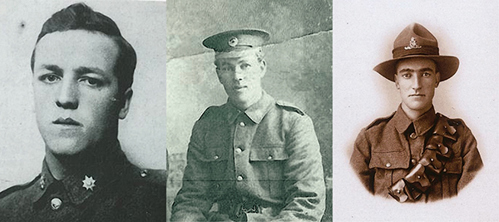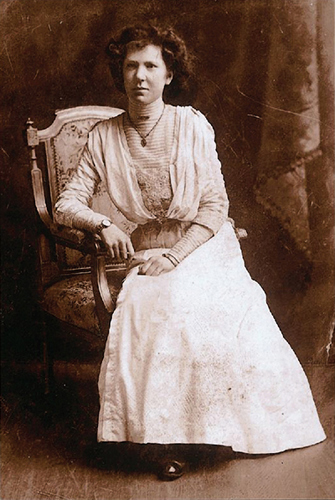Farming sons and survivors
The Taylor Brothers
Three Taylor brothers from Southland enlisted and fought in World War One – William, Thomas and David Taylor all fought for their country and Empire. The Taylor brothers’ parents were Charlotte Bates and William Taylor. They were married on Charlotte’s 23rd birthday in Riverton. Charlotte’s parents were Ann Pauley, née Williams, and Nathaniel Bates.

The Taylor Brothers. From left: David, Thomas and William Taylor.
In October 1915, William, the eldest of the three brothers, was working as a Shepherd for J. Burnett at Halfway Bay Station, Lake Wakatipua when he enlisted. After basic military training at Trentham Camp in Wellington, William left for Suez, Egypt on 8 January 1916. After nearly three years and a half years’ service, William would return to Southland with a Scottish wife, Agnes Ferguson Laidlaw.
Finlay Bayne, William’s grandson, remembers his grandfather well.
My grandfather, William Taylor, went to World War One but he never talked about the war. I knew him well as he lived close by, in fact we saw him every Sunday at our house, and we spent the school holidays with them. The only time he mentioned the war was about Trentham.
Finlay remembers his grandfather regularly attending the Anzac parade but he only recalls seeing him march in the parade once, as William did not want his grandchildren to have anything to do with war.
Prior to enlisting, William worked as a Shepherd at Cecil Peak station and it was there he met his future wife, Agnes Ferguson Laidlaw. Agnes had come from Rothesay in the Isle of Bute to take on a job as Nanny at Cecil Peak. Agnes returned to Rothesay when her employer returned to England to enlist.

Agnes Ferguson Taylor who received postcards from William while he was stationed in Belgium.
After the war ended, the couple married in Rothesay, at Agnes’s family home, in February 1919 and returned to New Zealand together on the troop ship TSS Kigoma.
Finlay recounts a story of his great grandmother, Charlotte Taylor, going to meet William in Dunedin on his return from the war. The family had not heard anything from William while he was away and didn’t know he had married Agnes. Charlotte took with her a former girlfriend of William’s to meet him off the train. Imagine their surprise when he introduced them to his wife and both women had to travel back home together.
Upon his return, William and Agnes once again worked together at Cecil Peak where William was appointed head shepherd at Glenary Station. The couple moved on to Willow Burn Station in 1927, and six months later they purchased a farm at Taumata in the Clinton District of South Otago. They remained on the farm for 20 years.
William stayed in Clinton until 1976, when he shifted to Palmerston, and moved in with his daughter May. William lived with May until his death in 1979.
Thomas (Tom) Joseph Bates Taylor was born 13 November 1894 in Southland. Tom was working on D. Finlayson’s farm as a Shepherd before enlisting on 3 May 1916. With a mere four months training under his belt, Tom embarked for Europe with the 16th Reinforcements, 1st Otago Infantry Battalion. He spent three years serving on the Western European Front – predominantly in the north of France – and had numerous transfers between regiments before returning home in August, 1919. Tom was discharged on 31 October 1919, on the termination of his period of engagement.
Finlay recalls that Tom had bad health as a result of being gassed during the war and this contributed to his death in July 1963.
Later, in January, 1942, Tom enlisted in World War Two, serving in the 3rd Reserve Mechanical Transport as a Driver. He was discharged in February 1943 due to failing health.
Finlay recalls that Tom had bad health as a result of being gassed during the war and this contributed to his death in July 1963.
David Frederick Clarke Taylor, the youngest of the three brothers, was born 31 July 1896 in Clinton, Otago. In keeping with family tradition, David also worked as a Shepherd, on James Begg’s farm in Willow Burn Station near Clinton.
David Frederick Clarke Taylor, the youngest of the three brothers, was born 31 July 1896 in Clinton, Otago. In keeping with family tradition, David also worked as a Shepherd, on James Begg’s farm in Willow Burn Station near Clinton.
According to Finlay, David never married.
He had a farm at Clinton, then one in Middlemarch, then bought a mail run from Outram to Middlemarch. In the slump he went on a fishing boat at Taieri Mouth. They came up the river to the Henley Pub on a ferry and he drowned coming out of the pub, and wasn’t found for three days. They didn’t know he was missing for a day.
David Taylor died on 22 April 1932.
For immediate whānau members wishing to have their own copy of the full video, please contact Whakapapa Ngāi Tahu on 0800 KAI TAHU (0800 524 8248).